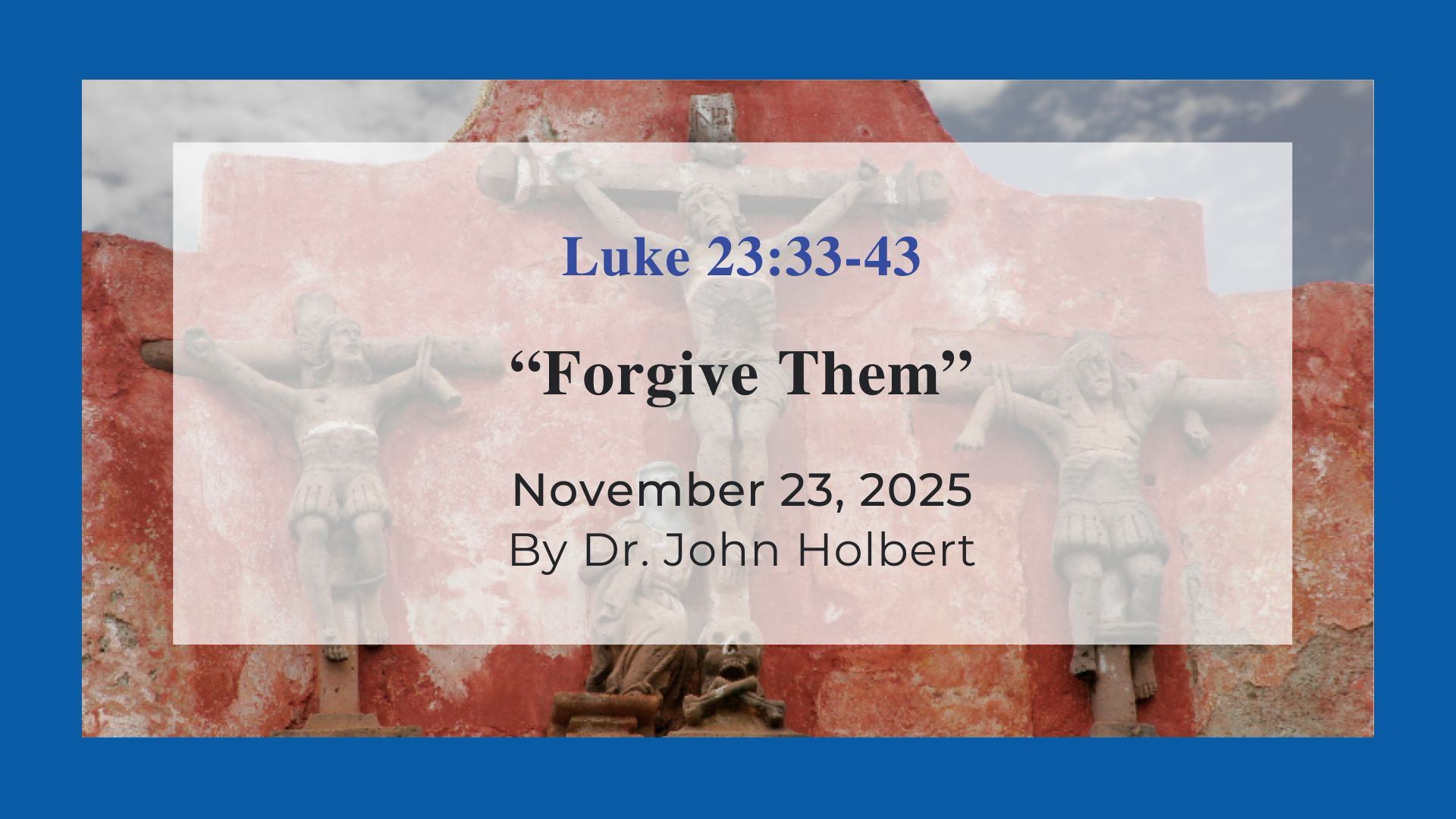Forgive Them - Reflections on Luke 23:33-43, Pentecost 24 (Reign of Christ), Year C
by John C. Holbert on Friday, July 4, 2025

It seems decidedly incongruous to end the liturgical year with Luke’s tale of the crucifixion of Jesus, just before we celebrate the birth of the same Jesus at Bethlehem in Advent. Then again, it may not be that odd after all, since the church year always moves from birth to death to resurrection to death to birth, etc. The cycle of Jesus’ earthly life calls us year after year to follow him, and a large part of that call includes inexorably his terrible death on the cross, the gateway to his rule and reign. Hence, it is somehow fully appropriate to gaze at that horrifying Roman means of torture and death as a necessary pathway to life for us all in him.
There is so much to reflect upon as we approach this text that I find it necessary to focus more sharply on a particular part of it. For me, that is the famous, and somewhat troubled, line in vs.34: Father, forgive them, for they don’t know what they are doing.” When I say the line is “troubled,” I hardly mean that its meaning is confusing or its import difficult to understand. Myriad sermons have been delivered using this statement, and multiple followers of Jesus have employed it as a central claim for their faith. How could this man, hanging painfully on that wooden cross, still muster the incredible gift of forgiveness to a world that had nailed him up there? And if he, at this very last moment of his life, had been able to forgive all for his murder, what does that say about me? Can I love my enemies as he apparently did? Can I conjure up enough trust in him to live my life for others as he did? These questions, among many others, have led countless Christians to offer their lives in service, using that stark image of the forgiving Jesus on that cross.
What is troubling for many scholars is that this famous line is not in the very best manuscripts we have of the Gospel of Luke. There are numerous manuscripts of the New Testament, some 5000 by one count, and it is the text critical scholar’s task to determine which ones represent the “best” of them. By best, the scholar means those texts that offer the least difficulties and present clarity and similarity in a large number of those texts. The line does seem to interrupt the flow of the narrative, breaking the movement of the tale from the fact of the crucifixion, and the criminals on each side of Jesus, and the casting of the lots for his garments after his death. Though it may not fit so neatly into the narrative flow, there are, I think, important reasons for Luke why this line should be seen as a part of his story.
Luke has consistently presented Jesus to us as a man of wisdom, one who demonstrates virtue in his words and actions. And here, like Socrates, who faced with his death by poison, spoke words of wise virtue, so Jesus here speaks a pronounced word of wise virtue, too. Maybe most importantly, Jesus’s words from the cross emphasize one of the crucial thoughts from the Lord’s Prayer in Luke 11:4: “Forgive us our sins, as we forgive others their sins.” In addition, Luke regularly emphasizes that when Jesus’s followers are sent to proclaim his message, they often recount the ignorance of those whom they speak to. For example, in Acts 3:17, Peter accuses the Jews in his audience at Solomon’s portico: “I know that (by killing Jesus) you acted in ignorance, as did also your rulers.” By focusing on the ignorance of the hearers, Jesus’ followers echo his forgiving words from the cross. And, the mission to be carried out by the apostles is based squarely on the “repentance for the forgiveness of sins,” as found in Luke 24:47, and throughout the book of the Acts.
In these ways and perhaps others, this amazing vs.34 must be seen as a part of the tale of Jesus’s death on the cross; that death would be significantly less powerful and significantly less integrated into Luke’s overall narrative plan without it. And, of course, later in the scene, Jesus will respond to the plaintive cry of one of the criminals by promising his forgiveness, too, and a place with him this very day in the paradise of God.
It may be little wonder why we modern followers of the Christ find this act of forgiveness among the very hardest of the work we are asked to do. Far easier it is simply to avoid difficult relationships, to forget about the pain we may have caused, and to write off others as enemies not worth our precious time. Jesus may after all be quite correct; we too often act out of ignorance, rather than than work hard actually to see the other, to understand what has led them to the place of anger or pain or the desire to hurt. Such forgiveness is hardly cheap; it surely was not cheap for Jesus as he was dying in agony. Genuine forgiveness is difficult, built on careful understanding of another, careful assessment of the other’s life. To witness Jesus utter these astonishing words of forgiveness is to get close to what true forgiveness may be. They are words of wise virtue by which one may live a fuller life in the world. I treasure these words, and however they may exist in Luke’s “original” Gospel, I am deeply glad that they are there. With them resounding in my heart, I am once again ready to enter Advent, awaiting the birth of the child who will grow to a forgiveness that I wish to emulate in my own life.
